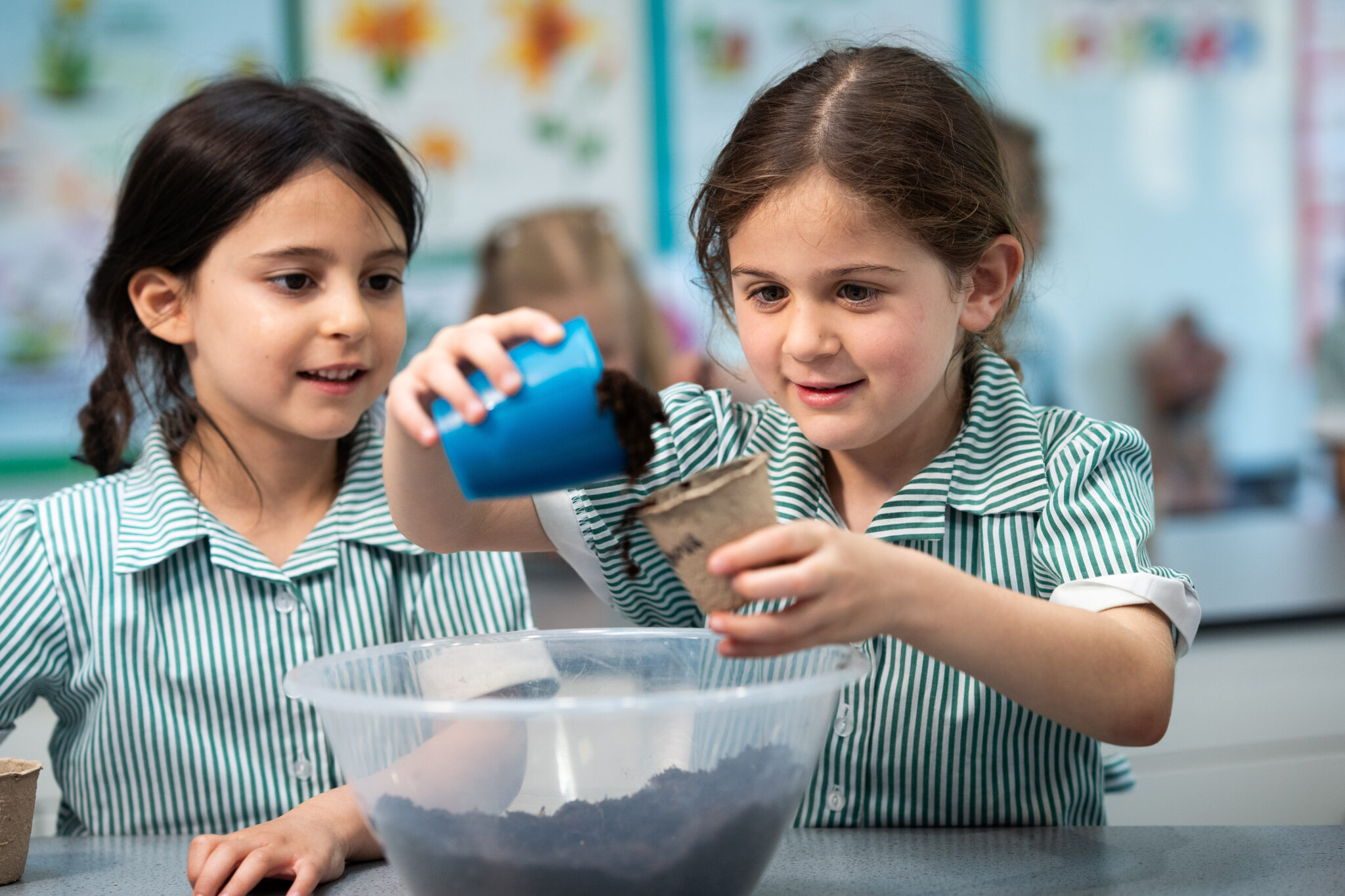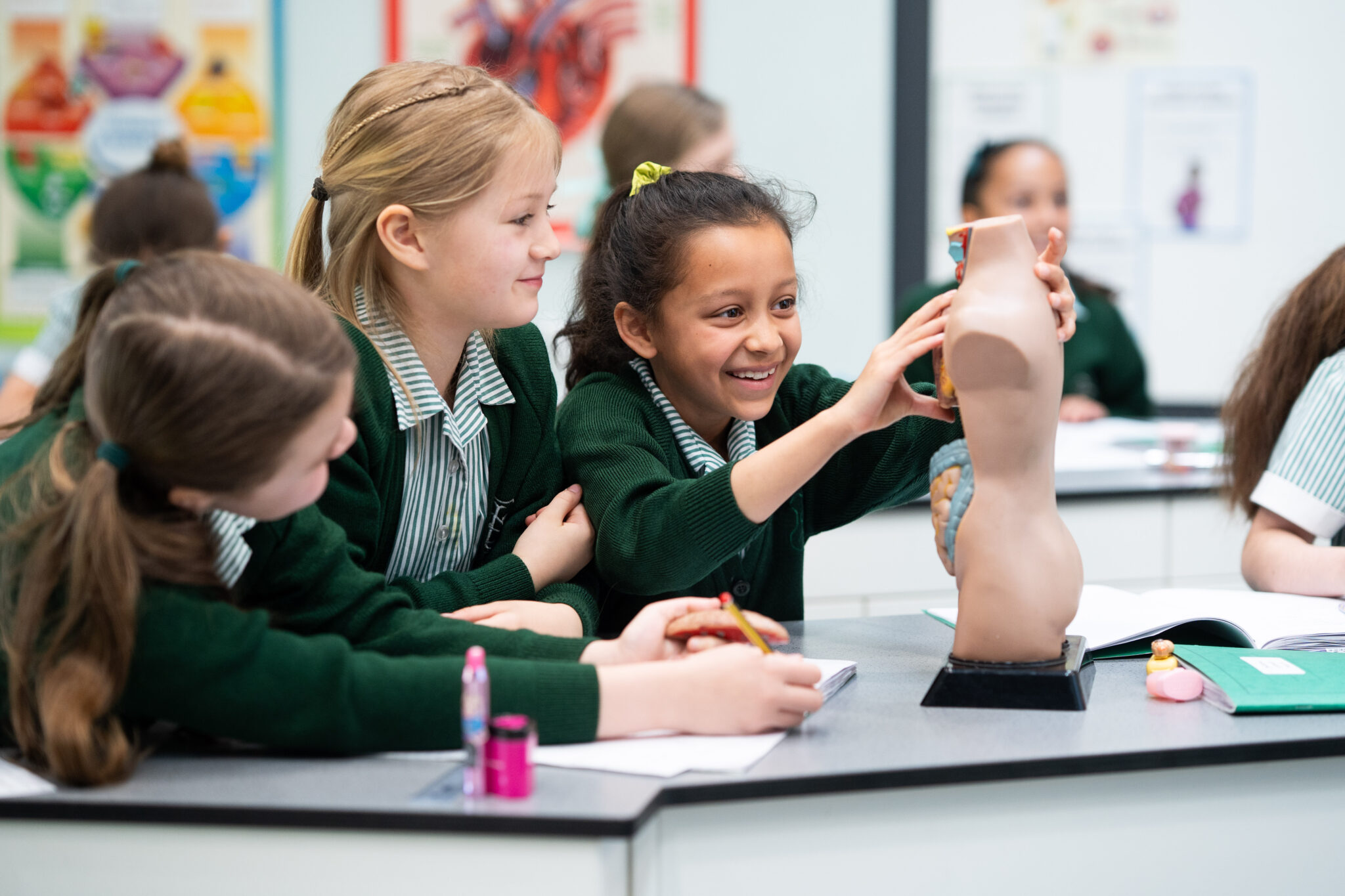We are non-selective and so do not select children at 3+ based on their academic ability. Despite this we have an established record of scholarship and examination success at 11+, and are extremely proud of our academic results. Our success is testament to the hard work of our pupils and dedicated teaching staff.
Academic
Art & Design
The arts are integral to Sarum Hall life and we believe that art provision is hugely important for children’s education from Nursery to Year 6.
Art and Design at Sarum Hall School encompasses three distinct curriculum areas: Art and Design, Design and Technology, and Food Technology. Throughout the academic year, each year group will explore different aspects of each of these areas.
These areas foster creativity and innovation, allowing pupils to express themselves and think outside the box. The Art and Design elements nurture aesthetic appreciation and visual communication skills. The Design and Technology parts enhance problem-solving abilities and practical skills, encouraging pupils to design and build solutions for real-world challenges. The Food Technology areas promote nutritional awareness and hands-on culinary skills, teaching pupils the importance of healthy eating. Throughout the curriculum, pupils will be exposed to key influential artists and designers.
Through undertaking projects in a range of mediums, experiences and starting points, it is hoped that pupils will be empowered to take more responsibility of, and be enthused in, their own learning. Our school aims to offer pupils opportunities to unleash their creativity and develop practical skills. These lessons are taught in the recently refurbished Art Studio.
Sarum Hall has been awarded Artsmark status across four art forms: art, music, drama and dance. The award process was rigorous and pointed out that “Provision well exceeds the criteria”.
Computing
We believe that the use of technology enriches pupils’ learning experiences, both as a tool and as a source of research and information. Our innovative IT classroom encourages pupils to become confident, autonomous users of a wide range of technological resources and to understand the role that technology plays in 21st-century life. Pupils from Year 2 onwards have their own personal iPad to use in computing and other areas of the curriculum, with other ICT integrated as necessary.
In today’s ever-evolving landscape of hardware and software, pupils require transferable, flexible skills that they can apply to numerous situations. They work on projects involving discussions and collaborative work and are exposed to a range of applications, including Purple Mash, to creatively produce engaging presentations, digital media, and animations. Pupils also learn to program simple algorithms and programs, building their understanding of computational thinking, logical reasoning, and problem-solving. They are taught about the history of computing and our digital heritage, including key developments and influential inventors. Our e-safety curriculum teaches pupils how to identify unsafe situations and where to seek help if they feel uncomfortable. Pupils are taught tools they need to develop their own sense of digital well-being.
Diversty & Inclusion
‘In diversity there is beauty and there is strength’ – Maya Angelou
We recognise that every member of our community brings an exciting individuality to the life of the School and we actively promote the benefits of a collaborative approach at Sarum Hall. We want everyone to flourish through a sense of belonging and we create a diverse and inclusive environment which encourages children to be curious and embrace innovation, whilst striving for excellence and making a positive contribution to society. All pupils are encouraged to be open to change and develop the resilience and skills that are required to lead happy, healthy, active, creative and fulfilling lives. We want every member of our school community to feel valued and included.
However, we strongly believe that this approach needs to be embedded into our daily routines and overall curriculum in order for it to have the desired impact. Our Diversity and Inclusion Coordinator ensures that diversity is taught and implemented both in and out of school and helps to facilitate relevant projects in conjunction with the PSHE Coordinator. Our aim is to promote a culture of curiosity and an understanding of the need for inclusion and acceptance of our individual place within society.
English
We believe that every pupil should enjoy language and literature in all its forms. We implement The Power of Reading created by CLPE (Centre for Literacy in Primary Education), a proven programme that supports our staff to deliver a high-quality English curriculum which develops reading comprehension and writing composition, and fosters a whole school love of reading and writing. English is delivered through a variety of exciting and interactive activities that contextualise essential writing knowledge, enabling pupils to progress in reading, writing, spelling, punctuation, grammar, and handwriting.
Delivered by the Form Teacher, the Power of Reading puts quality children’s literature at the heart of English learning and enables all the teaching and learning to be centred around one text either per term or per half term. This allows the pupils to enjoy reading and be fully immersed into a text. It also enables the pupils to have a deeper understanding of the variety of texts, author’s language, the impact of illustrations and opens the discussion of life experiences. It also supports us in raising engagement and attainment in language, vocabulary, reading and writing. Each text provides a variety of writing outcomes, exposing pupils to different text types and teaching them the necessary features to include in their writing.
From the end of Year 5 and throughout the Autumn Term of Year 6, pupils will gain experience and confidence in the 11+ entrance exams. It also helps to provide a reliable indicator as to where they might stand in relation to any offer of a place.
Enrichment
There is an extensive range of trips, residential visits and visiting speakers during the school year. We take full advantage of the museums, theatres and places of interest in the capital.
As well as these, Year 5 and 6 take part in different annual residential trips.
Geography
Geography is a dynamic and exciting subject. We teach geographical skills and knowledge within context, utilising a variety of topical and relevant resources and we aim to enrich our lessons by celebrating the diversity of our school’s community and drawing upon pupils’ experiences.
In Key Stage 1, we ensure that pupils develop knowledge about the world, the United Kingdom, and their local area. They will learn basic subject-specific vocabulary related to human and physical geography and begin using geographical skills, including first-hand observation, to enhance their locational awareness.
Throughout Key Stage 2, we ensure that pupils extend their knowledge and understanding beyond the local area to include the United Kingdom and Europe, North and South America. This will include the location and characteristics of a range of the world’s most significant human and physical features. They will develop their use of geographical knowledge, understanding and skills to enhance their locational and place knowledge.
History
Knowing about our past is important because it gives us, both as individuals and as a society, an understanding of who we are; it gives us a sense of identity. We also understand our world better and our place in it when we know about other people’s past as well as our own.
In Key Stage 1, we foster an awareness of the past in our pupils by teaching them to use common words and phrases related to the passage of time. We ensure they understand the chronological placement of the people and events they study and can identify similarities and differences between lifestyles in various historical periods. We offer a curriculum that encourages the use of a broad vocabulary of everyday historical terms. The pupils are guided to ask and answer questions, using parts of stories and other sources to demonstrate their understanding of key events. Additionally, we teach them the methods of discovering the past and recognising the different ways it is represented.
In Key Stage 2, pupils are encouraged to develop a secure, chronological understanding of British, local, and world history, enabling them to form clear narratives both within and across the historical periods they study. We emphasise the importance of recognising connections, contrasts, and trends over time, as well as the appropriate use of historical terminology. Our curriculum encourages pupils to regularly engage with, and sometimes formulate, historically valid questions related to change, causality, similarities and differences, and significance. We guide them in constructing well-informed responses through the thoughtful selection and organisation of relevant historical information, while also helping them to understand how our knowledge of the past is built from a variety of sources.
Maths
We aim to inspire a love of mathematics in every pupil. We want every pupil to look forward to their maths lessons and to achieve the highest standard that they possibly can.
We focus on developing our pupils’ key number skills at an early age, and teach them how to apply these to different problem solving scenarios in a fun and stimulating way, with lots of games, investigations and extension activities for the pupils to explore. Group work, discussion and problem solving are at the heart of our learning approach, supported by accurate use of mathematical language and written notation.
Our pupils have opportunities to participate in national competitions, such as the First Maths Challenge and Primary Maths Challenge. Additionally, we are a Problem Solving School in collaboration with nRich.
From the end of Year 5 and throughout the Autumn Term of Year 6, pupils will gain experience and confidence in the 11+ entrance exams. It also helps to provide a reliable indicator as to where they might stand in relation to any offer of a place.
Music
Music is a universal language that represents one of the highest forms of creativity. We provide high-quality music education that engages and inspire pupils, fostering a love for music and developing their talents as musicians, thereby boosting their self-confidence, creativity, and sense of achievement.
In music lessons, our pupils are exposed in equal measure to the three key elements of performance, composition and listening. We teach pupils to use their voices expressively and creatively by singing songs and speaking chants and rhymes. They learn to play both tuned and untuned instruments musically, and to listen with concentration and understanding to a variety of high-quality live and recorded music. Additionally, we encourage them to experiment with, create, select, and combine sounds using the inter-related dimensions of music.
Each week, we have two music assemblies, one for music appreciation and one for performance. Pupils of any standard perform.
Music groups
The Junior and Senior choir meet as an after-school club. There are ensembles according to the instruments being learned, including string, cello and wind groups, as well as a chamber ensemble. There is also a Junior string group, for violin and cello beginners, a recorder group and a flute group. Musical theory classes occur during lunch breaks and before school for girls working towards Grades 1 to 5.
From the Summer Term of Year 1, pupils are able to opt for instrumental lessons; currently on offer are piano, violin, cello, saxophone, woodwind and singing. Peripatetic music teachers teach individual lessons, music ensembles and assist the orchestra.
Associated Board exams are taken each term, and the consistently high standards achieved by the pupils reflect the high quality of teaching. Our pupils consistently gain music scholarships for their chosen senior schools.
PSHE
Personal, Social, Health and Economic (PSHE) education helps to give pupils the knowledge, skills and understanding they need to lead confident, healthy, independent lives and to become an informed, active, responsible citizen.
Through our curriculum and culture, we develop values, promote social and emotional well-being and take responsibility for preparing our pupils for their future. We strive to teach our pupils the skills and processes which will enable them to be happy and fulfilled individuals in a healthy, supportive environment. The curriculum actively promotes the fundamental British Values and incorporates the issues of social, moral, spiritual, cultural, mental and physical development.
All members of staff help pupils to develop values, attitudes, knowledge, skills andunderstanding centred around the aims of PSHE at Sarum Hall School. The PSHE curriculum is primarily delivered by Form Teachers. When appropriate, specialist teachers and speakers are brought in from outside organisations. Relationships and Sex Education (RSE) is delivered by Form Teachers at an age-appropriate level.
Physical Education & Sports
We aim to nurture and develop the competence and confidence of all pupils in a range of activities. Pupils at Sarum Hall School enjoy an extensive range of sports in a cooperative and stimulating environment. Lessons take place in our purpose-built, well-equipped gymnasium, outside on our multi-purpose Astroturf and at Primrose Hill.
In Key Stage 1, we ensure that pupils develop fundamental movement skills, becoming increasingly competent and confident while accessing a broad range of opportunities to enhance their agility, balance, and coordination, both individually and with others. They engage in competitive and cooperative physical activities across a variety of increasingly challenging situations. Our curriculum enables pupils to master basic movements such as running, jumping, throwing, and catching, while also developing balance, agility, and coordination, and applying these skills in various activities. Pupils participate in team games, learning simple tactics for attacking and defending, and perform dances using simple movement patterns.
In Key Stage 2, we encourage pupils to continually apply and expand a broad range of skills, learning how to use them in various ways and integrate them to create fluid actions and sequences of movement. We foster an environment where pupils enjoy communicating, collaborating, and competing with one another. Our aim is to help pupils develop a deep understanding of how to improve in different physical activities and sports, as well as to evaluate and recognise their own achievements. Pupils are taught to use running, jumping, throwing, and catching both individually and in combination. They participate in competitive games, such as netball, cricket, football, and rounders, and they apply basic principles suitable for attacking and defending. Additionally, they develop flexibility, strength, technique, control, and balance through activities like athletics and gymnastics, perform dances incorporating a variety of movement patterns, and engage in outdoor activities, both individually and as part of a team. Throughout their learning, pupils are encouraged to compare their performances with previous efforts and demonstrate improvement to reach their personal best.
Reasoning
To effectively prepare pupils for senior school entrance exams at 11+ and to strengthen their overall reasoning and deductive abilities, Verbal and Non-Verbal Reasoning is taught from Year 4 until the Autumn Term of Year 6. Using a series of workbooks, online resources, and a methodical approach, pupils are introduced to various question types and learn how to solve them proficiently. In Year 6, lessons provide plenty of practice and strategies for tackling each question type, whilst reinforcing core skills and increasing the speed at which pupils can answer questions.
Religious Education
We promote spiritual, moral, social and cultural development throughout our curriculum including through the teaching of religious education (RE).
RE at our School helps pupils develop their knowledge and understanding of the seven major world religions: Buddhism, Judaism, Islam, Hinduism, Sikhism, Christianity, and Humanism.
We explore each religion’s beliefs, founders, holy books, religious symbols, foods, and festivals. To enhance their learning, we organise visits to various places of worship, allowing our pupils to fully immerse themselves in the experience and practice of each religion.
RE also enables pupils to consider and respond to a range of important questions related to their own spiritual and philosophical development.
Assemblies, although Christian based, also reflect the diversity of religious festivals and practices that are celebrated in our school. The whole school community attends and participates in annual Christmas and Harvest Services at St Mary’s Church, a local church with which we have close links. We also support a range of charities and communities both locally and abroad.
Science
Science at Sarum Hall School is exciting, engaging and thought provoking. We encourage our pupils to think creatively by making the most of our well-resourced science laboratory.
The main focus of science teaching is to allow pupils to experience and observe phenomena, exploring both the natural and human-made world around them. We encourage our pupils to be curious and ask questions about their observations. To help them develop their understanding of scientific concepts, we guide them in using various types of scientific inquiry to answer their questions, including observing changes over time, noticing patterns, grouping and classifying objects, conducting simple comparative tests, and using secondary information sources.
Our pupils are introduced to simple scientific language to discuss their findings and communicate their ideas to different audiences in various ways. While most science learning is conducted through hands-on practical experiences, we also incorporate appropriate secondary sources like books, photographs, and videos to enhance their understanding.
Spanish
At Sarum Hall School, we believe a child’s developing mind is enriched by exposure to different languages as this provides them with invaluable social and cultural experiences, and lays the foundation for future language learning as well as preparing them for life in a multi-cultural society.
All pupils study Spanish from Year 3. Lessons comprise asking and answering questions, expressing opinions, playing games and appreciating stories. The pattern and sounds of the language are explored through songs, poems and rhymes. We provide a blend of spoken, listening, reading and written skills in Spanish which consolidate and broaden pupils’ knowledge as they progress through the school.



